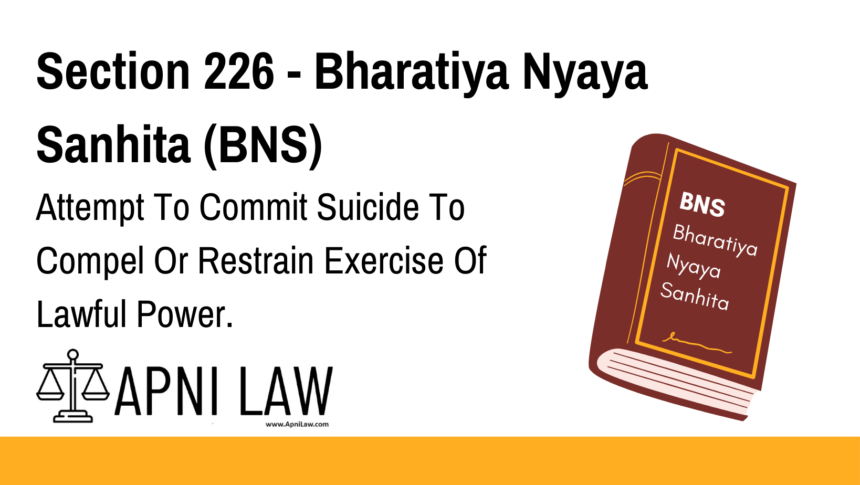Code: Section 226 BNS
Whoever attempts to commit suicide with the intent to compel or restrain any
public servant from discharging his official duty shall be punished with simple imprisonment
for a term which may extend to one year, or with fine, or with both, or with community
service.
Explanation of Section 226 BNS
Section 226 of the Bharatiya Nyaya Sanhita, 2023 criminalizes attempts to commit suicide when done with the intention of influencing public servants in the discharge of their official duties. Unlike cases where suicide attempts stem from personal distress, this section applies specifically to acts of coercion targeting government officials.
Key Elements of the Offense:
- Attempt to Commit Suicide: The person must have made a deliberate attempt to take their own life.
- Intent to Influence a Public Servant: The attempt must be made to either compel or restrain a government official from performing their legal duty.
- Punishment:
- Simple imprisonment (up to one year)
- Fine
- Both imprisonment and fine
- Community service as an alternative punishment
Illustration
Example 1: A Protester Attempts Suicide to Stop an Eviction Drive
A group of people facing eviction due to illegal encroachment protest against government officials. One individual climbs a building and threatens to jump unless the eviction is halted. This act, meant to restrain officials from carrying out their legal duties, falls under Section 226 BNS.
Example 2: An Employee Attempts Suicide to Pressure a Government Officer
A government employee, upset over a denied promotion, attempts self-harm inside the office of a senior bureaucrat to force a reconsideration. Since the act is intended to compel a public servant to act in a specific way, it constitutes an offense under Section 226 BNS.
Common Questions and Answers on Section 226 BNS
1. Does every suicide attempt fall under Section 226 BNS?
No. This section applies only when the suicide attempt is made with the intent to influence a public servant’s decision. General suicide attempts due to personal distress or mental health conditions are not covered under this provision.
2. What kind of public servants are covered under this section?
All legally authorized public servants—such as police officers, judges, municipal officials, and government employees—fall under this section if they are being coerced through a suicide attempt.
3. What is the punishment under Section 226 BNS?
The offense is punishable by:
- Simple imprisonment (up to one year)
- Fine
- Both imprisonment and fine
- Community service as an alternative punishment
4. How is Section 226 BNS different from abetment of suicide under Section 224 BNS?
While Section 224 BNS penalizes a person who encourages or assists in a suicide, Section 226 BNS applies to individuals attempting suicide to manipulate a public servant.
5. Does this section criminalize suicide attempts in general?
No. The provision only penalizes suicide attempts made with coercive intent. Other cases of attempted suicide due to mental health issues fall under different legal provisions and are often dealt with under mental healthcare laws rather than criminal law.
Conclusion
Section 226 BNS ensures that suicide attempts are not misused as a tool for coercion. By penalizing such acts, the law protects public servants from undue pressure while allowing alternative corrective measures like community service.
For more legal insights, visit ApniLaw today! 🚀








